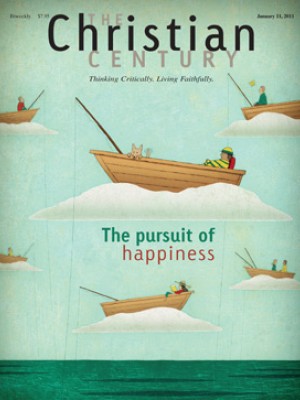Sunday, January 16, 2011: John 1:29-42, 1 Corinthians 1:1-9, Isaiah 49:1-7
He saw Jesus coming toward him and declared, "Here is the Lamb of God who takes away the sin of the world!" (John 1:29)
The event cited in the Gospel lesson has often been celebrated in art, notably in Matthias Grünewald's depiction of the gaunt John the Baptist pointing a bony finger at Jesus with the words: "Here is the Lamb of God who takes away the sin of the world!" The evangelist's description of the setting is spare. On a certain day John the Baptist is baptizing in Bethany beyond the Jordan. On the next day he sees Jesus coming, and out of the blue he blurts out the exalted title. All seems scripted, stilted and without a preaching handle.
When and where and under what circumstances in 2011 does it ever happen that Christians "see Jesus coming" and call out "Here is the Lamb of God who takes away the sin of the world"? We don't live in Bethany beyond the Jordan, and that time is not our time. Yet here is a way into an abundant text that can speak to our time.
Read our latest issue or browse back issues.
Not long ago I was meeting with a family in the narthex of the church and preparing for the funeral service of their loved one, which was to take place that morning. We were ready to close the casket and I began to lead in prayer. Then the narthex church door opened and a man entered. I thought he was a latecomer hurrying in to the funeral.
He made his way to me, apologized for the untimely intrusion and asked if he could speak with me then and there. His face was such a roadmap of anxiety and his agitated manner so revealing of his need that I realized I could not refuse him. I recognized him as someone who was once with us in the congregation but who had left after giving me more grief—years of it—than anyone I've known through my pastoral years.
We stepped aside to a quiet corner. He looked me straight in the eye and got right to the point: "Dean, I've come to tell you how deeply sorry I am for the sins I have committed against you. I ask you to forgive me." Bam—just like that! I knew by the earnestness of his words and the piercing intensity in his eyes that he spoke from the depths of his being and meant every word. This untimely but immensely powerful moment was the fruition of a long, complicated process of stocktaking. On that day, in that place, without forewarning, a John 1:29 moment arrived.
Preaching means announcing God's judgment upon sin and announcing God's promise to redeem us and the world we live in. Doesn't it mean, in some shape or form, pointing to the Lamb of God who takes away the sins of the world? That said, think of my experience in the church narthex as but one of the myriad ways, times and places in which preaching occurs. Unprepared though I was for it, the Lord Jesus presented himself to me in the person of a tortured man who had been battling his inner demons for years and calling them Dean Lueking. When I spoke his name, put my hands on his shoulders, looked him in the eye and said, "I forgive you," I said the only thing that a fellow forgiven sinner can say, needs to say and wants to say. Then, in forgiving him, I was freed to ask him to forgive me for the sin of resentful judgment against him that had been simmering in me much too long. His response? He caught me up in a near rib-cracking bear hug, then turned and left.
Look for the immediacy of the contextual details (place, time, persons named, action described) in the John 1:29–42 passage and for the substance of what's going on. The Lamb of God is at hand. Forgiveness of sin is offered. The Spirit bears witness. Andrew invites Simon to see what it's all about. A community is being formed that will become the one holy, catholic and apostolic church. All of this is unfolding in the midst of everyday routine. Apparently God shows up in the middle of routine, whenever talk and action turn upon the divine grace that forms and commissions Christ's people for healing and reconciling in the world.
How one preaches the John 1:29 text and goes about taking it into our time will necessarily vary. Certainly all the rules of confidentiality apply when citing lived experiences of repentance and forgiveness. But if the one preaching is clear about the power of sin forgiven, those listening get the message and are equipped to take the good news into the next seven days. God packs the power to reclaim from sin and renew through grace into a word we can speak and embody in life. I bear witness to how thrilling and sustaining it is to keep on discovering the trustworthiness of that truth year after year, situation after situation, personal and public, local and global.
1 Corinthians 1:1–9 is like a deep breath that St. Paul takes before diving into the rowdy mess called the church of God in Corinth; the "God is faithful" affirmation is his periscope keeping the goal in view. Isaiah 49:1–7 summons the faithful to listen up, to have done with whining, for the mighty deeds of God are beyond anything yet seen. What a wealth of textual choices are set before us!






